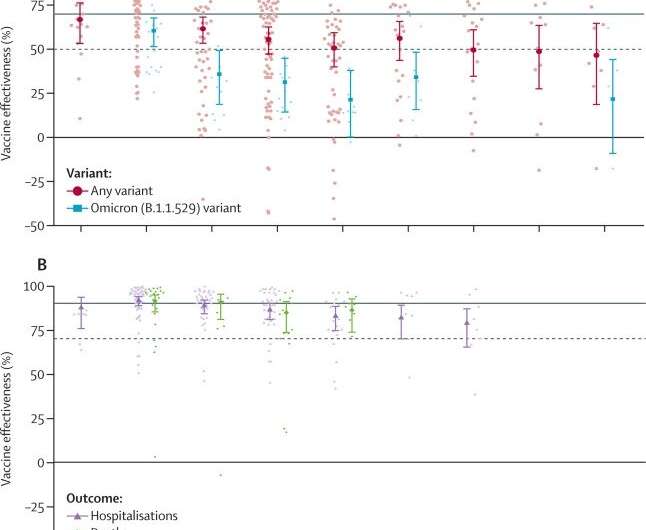This article has been reviewed according to Science X's editorial process and policies. Editors have highlighted the following attributes while ensuring the content's credibility:
fact-checked
peer-reviewed publication
trusted source
proofread
The first line of vaccines was highly effective at restricting COVID-19's damage, says new study

A new Concordia-led analysis concludes that the primary COVID-19 vaccines provided adequate protection against transmission, hospitalization and death. However, their effectiveness waned in subsequent months, and fell below acceptable levels in the face of the Omicron variant.
The study was published in The Lancet Respiratory Medicine. It is based on data extracted from 68 separate studies published up to December 1, 2022. The paper grew out of a series of monthly reports by researchers at the Montreal Behavioural Medicine Centre, which were commissioned by the Public Health Agency of Canada and the COVID-Evidence Network to support Decision-making (COVID-END). Using tri-level meta-analytic models, the study assessed the four vaccines available in Canada: those developed by AstraZeneca/Oxford, Janssen, Moderna and Pfizer-BioNTech. The study did not examine the effects of newer bivalent boosters.
"The vaccines that were originally developed were very effective against every strain except Omicron," says Simon Bacon, a professor in the Department of Health, Kinesiology and Applied Physiology and the study's corresponding author. "And these primary vaccines held for quite a while. There was some slippage but the level of protection they provided was consistent with the World Health Organization's guidelines [around 75 percent effectiveness]."
Concordia postdoctoral fellows Nana Wu and Keven Joyal-Desmarais led the study. Contributors include Concordia Ph.D. students Ariany Marques Vieira and Comfort Sanuade, former Concordia postdoc Jovana Stojanovic, and research associates Paula A B Ribeiro and Doro Yip.
Strong initial results
The researchers found the vaccines developed prior to Omicron's emergence provided an 83 percent effectiveness against infection at baseline, i.e., between 14 to 42 days. Effectiveness decreased to 62 percent by 112 to 139 days (16 to 20 weeks). That number dipped to only 47 percent by 280 days (40 weeks).
The vaccines were 92 percent effective against hospitalizations at baseline. That figure decreased to 79 percent at 224 to 251 days, or 32 to 36 weeks.
Regarding mortality, the vaccines were 91 percent effective in preventing deaths at baseline. Their rate of effectiveness changed to 86 percent at 168 to 195 days (24 to 28 weeks).
Booster doses showed reasonably stable long-term protection against hospitalizations and mortality but also similar rates of declining effectiveness. Booster protection against infection was more modest, performing slightly below WHO guidelines at baseline.
The researchers also note that messenger RNA (mRNA) vaccines developed by Moderna and Pfizer-BioNTech were more effective against infections than the adenovirus vaccines from AstraZeneca/Oxford and Janssen. Still, both types of vaccine provided similar levels of protection against hospitalizations and mortality.
The Omicron variant's emergence in 2021 upended these numbers, says Bacon. Baseline protection against infection dropped to around 67 percent and diminished rapidly. However, he notes that the primary vaccines were better at protecting people against hospitalizations and mortality.
"If we really want to get on top of the pandemic and stop infections when they start spiking, we probably need something more than just the vaccine," Bacon points out. He says masking and social distancing remain the best ways to reduce infections and halt the spread of the virus.
Hygiene measures are still important
Bacon adds that he realizes local governments and society at large have largely moved on from those early pandemic policies, which are unlikely to return without a sharp increase in infections. He warns that now is not the time to stop thinking about COVID-19 or to disregard public health measures altogether.
"If you are very well-vaccinated and you are low-risk, then you probably will not end up in hospital or dying from COVID-19," he comments. "However, people should be conscious of people of higher risk, and of interacting with each other. If you are a person who is low risk and become infected with the virus, you will probably be fine. But a vaccine alone will not prevent you from possibly transmitting the virus to someone who is high risk. And that person may end up with severe consequences."
More information: Nana Wu et al, Long-term effectiveness of COVID-19 vaccines against infections, hospitalisations, and mortality in adults: findings from a rapid living systematic evidence synthesis and meta-analysis up to December, 2022, The Lancet Respiratory Medicine (2023). DOI: 10.1016/S2213-2600(23)00015-2





















